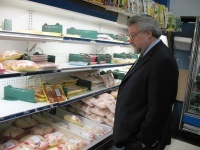c. 2008 Religion News Service
NEW YORK _ At the Jewish supermarket closest to Rabbi Gerald C. Skolnick’s synagogue in Queens, N.Y., all the groceries are certified kosher, including rows of refrigerated chicken legs and hamburger patties.
But Skolnik checks the poultry labels carefully, avoiding cuts from Agriprocessors, the Iowa meatpacking plant charged with more than 9,000 counts of child labor violations. He avoids the beef entirely, because those packages don’t list their origins.
“The guy who runs this place told me most of the meat here is Rubashkin,” he said, referring to the family that owns the accused plant. “The classical definition of kashrut (kosher) is about making sure you adhere to the ritual elements, but if you’re going to say you hold yourself to a higher power, the working conditions matter, too.”
That sentiment is the foundation of Hekhsher Tzedek, a Conservative Jewish initiative to create a seal that would certify kosher food as the result of fair labor practices _ not just ritual slaughter techniques derived from Jewish law.
“With kosher food, the product itself is supposed to resonate holiness,” Skolnik said. “Therefore, theoretically, everyone who keeps kosher should care about this.”
Rabbi Morris Allen, the Minnesota-based head of the project, has asked U.S. rabbis to use the upcoming high holidays of Rosh Hashanah and Yom Kippur to preach about the importance of eating ethically, as well as ritually, kosher cuisine.
With synagogue pews packed with Jews fasting and praying about reflection and repentance, Yom Kippur (which begins on Oct. 8 this year) is the ideal time to preach on this theme, proponents argue.
“(The prophet) Isaiah said there has to be a vital connection between the ritual and ethical aspects of our lives, that one without the other is essentially just a half-empty cup,” Allen said, referring to a biblical passage read during high holiday services.
“So, on Yom Kippur particularly, it’s a very appropriate time to address this issue.”
The Hekhsher Tzedek initiative began as a Conservative project, and has already been endorsed by an umbrella group of Reform rabbis. The broader concept _ that workplace conditions should be considered as part of what makes a food product “kosher” _ has also been picked up by Uri L’Tzedek, an Orthodox organization that boycotted Agriprocessors this summer.
The Iowa plant named a new CEO several weeks ago after the Orthodox Union threatened to revoke the plant’s kosher certification. The threat was prompted by the criminal charges, not the Hekhsher Tzedek campaign, but Allen considers it a sign that workplace standards are beginning to shape Jewish ideas about what “kosher” really means.
The initiative plans to evaluate employees’ wages and benefits, employee health and safety, product development, corporate transparency and environmental impact. The Hekhsher Tzedek seal of approval would supplement, but not replace, traditional kosher labeling.
“Every human being is created in the image of God,” said Rabbi Jennie Rosenn of the Nathan Cummings Foundation, which funds the project, “and should be treated with respect.”
Still, leaders of the “ethical-kosher” movement recognize that some rabbis _ especially in the strictly kosher Orthodox movement _ have valid concerns about how Hekhsher Tzedek could impact prices and availability of kosher products.
What’s more, others wonder if workplace standards are better monitored and enforced by the government, not the religious establishment.
“To say they should be in charge of investigations, they don’t have the training to do that,” said Rabbi Aaron Levine, an economics professor at Yeshiva University and author of “Moral Issues of the Marketplace in Jewish Law.”
“If people want to get involved to improve the quality of a work environment, that’s very good, but you have to know your limits. To go beyond your expertise, that’s wrong.”
(BEGIN OPTIONAL TRIM)
Some Jewish leaders also worry the fledgling effort could only exacerbate tensions within the Jewish community by separating those who believe Judaism should focus on preserving traditions and rituals _ a priority for Orthodox Jews _ and those who are more concerned with its social justice applications.
Rabbi Brad Hirschfield, president of the New York-based think tank CLAL _ The National Center for Learning and Leadership, said religious leaders should encourage adherents to learn from each other, rather than view this debate as one group forcing its values onto the entire community.
“Agriprocessors is the stage on which different religious and political factions have been playing out their issues,” he said. “The real issue as we come to Yom Kippur, which is about forgiveness and repentance, is are we going to regard each other’s understandings about what it means to keep kosher in a forgiving and understanding way?”
(END OPTIONAL TRIM)
Allen, the Minnesota rabbi, predicted that the ethical-kosher seal he hopes to unveil next year will ultimately appeal to all Jews, as well as secular shoppers. Agriprocessors could even help to restore consumer faith in its products by applying for the certification, he added.
“This will be a win-win for the kosher food industry,” he said. “More people will end up buying kosher products as a result of this.”
KRE/RB END NEROULIASEds: Note time reference in 7th graf: Yom Kippur begins at sundown on Oct. 8. Rosh Hashanah begins at sundown on Sept. 29. Also note that `Rosenn’ in 13th graf is CQ
850 words, with optional trim to 700
A photo of Rabbi Gerald Skolnick is available via https://religionnews.com.





